Application Notes
Items 13-51 of 39 Results
-
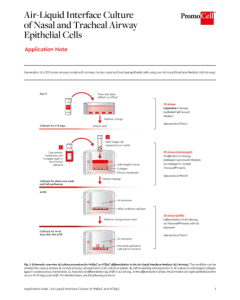
Air-Liquid Interface Culture of Nasal and Tracheal Airway Epithelial Cells
Generation of a 3D human airway model with primary human nasal and tracheal epithelial cells using our Air-Liquid Interface Medium (ALI-Airway). -
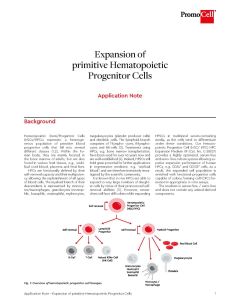
Expansion of primitive Hematopoietic Progenitor Cells
Researchers are facing difficulties during in vitro expansion of undifferentiated hematopoietic stem cells (HSC). Our Hematopoietic Progenitor Cell (HPC) Expansion Medium XF provides a highly optimized, and xeno-free culture system for human HSC. -
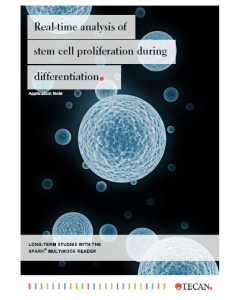
Real-time analysis of stem cell proliferation during differentiation
Here we describe the real-time analysis of human stem cell differentiation using cell-based assays. This allows for quantification of cell viability, proliferation and apoptosis. -
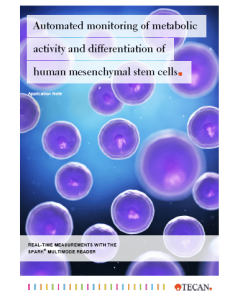
Automated monitoring of metabolic activity and differentiation of human mesenchymal stem cells
Detailed analysis of human stem cells offers the potential for the specific treatment of diseases by cell-based therapies. With an automated real-time analysis, we assess phenotypic changes during mesenchymal stem cell (MSC) differentiation. -
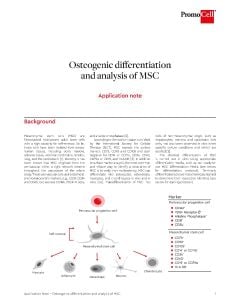
Osteogenic differentiation and analysis of mesenchymal stem cells (MSC)
Differentiate mesenchymal stem cells (MSC) into osteoblasts. Read our application note and find out more. The multipotency of these cells is one essential characteristic of MSC, according to the International Society for Cellular Therapy. -
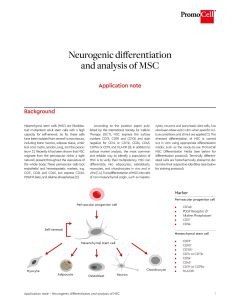
Neurogenic differentiation and analysis of mesenchymal stem cells (MSC)
Specific culture conditions allow for transdifferentiation of mesenchymal stem cells (MSC) into cells of non-mesenchymal origin such as neurons. To do so, specific culture conditions and stimuli are needed. -
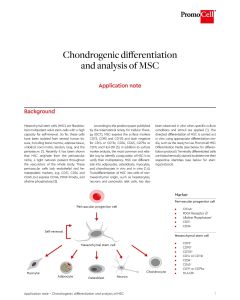
Chondrogenic differentiation and analysis of mesenchymal stem cells (MSC)
Managed in vitro differentiation of mesenchymal stem cells (MSC) into chondrocytes. Multipotent adult stem cells are important for various tissues of the musculoskeletal system. -
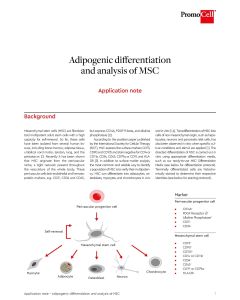
Adipogenic differentiation and analysis of mesenchymal stem cells (MSC)
Turning mesenchymal stem cells (MSC) into adipocytes is the aim of this application note. Research using MSC is a field of high interest and could ultimately lead to new therapies for treating a variety of lifestyle diseases. -
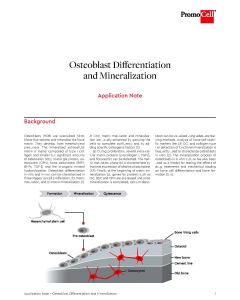
Osteoblast differentiation and mineralization
Osteoblasts are specialized fibroblasts that secrete and mineralize the bone matrix. Their differentiation in vitro and in vivo can be characterized in three stages. We describe analysis of different molecular markers of those processes. -
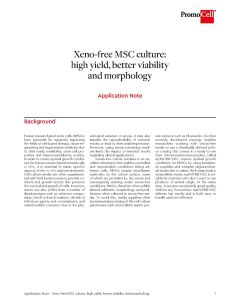
Xeno-free MSC culture: high yield, better viability and morphology
Are you trying to mimic in vivo conditions in your MSC cultures as closely as possible, but need to avoid serum? Then find out how the combination of PromoCell DXF medium and a unique coating called myMATRIX help you make your conditions highly physiological while maintaining reproducibility. -
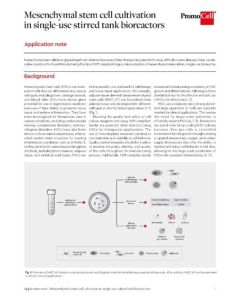
MSC cultivation in single-use stirred tank bioreactors
MSCs have gained significant attention because of their therapeutic potential for many difficult-to-treat diseases. In this app note, we provide a protocol for (GMP) compliant large-scale production of MSCs in a single-use bioreactor using our MSC Growth Medium XF. -
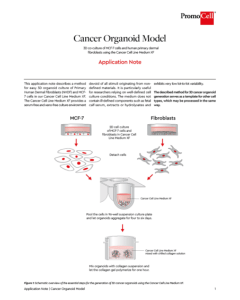
Cancer organoid model
This application note describes a method for easy 3D organoid culture of Primary Human Dermal Fibroblasts (NHDF) and MCF-7 cells in our Cancer Cell Line Medium XF. -
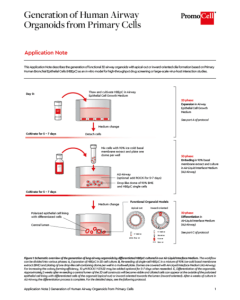
Generation of human airway organoids from primary cells
This Application Note describes the generation of functional 3D airway organoids with apical-out or inward-oriented cilia formation based on Primary Human Bronchial Epithelial Cells (HBEpC) as an in vitro model for high-throughput drug screening or large-scale virus-host interaction studies. -
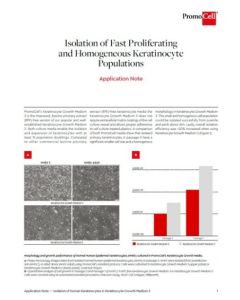
Development of a high throughput 3D in vitro wound healing model
Studying wound healing is a challenge, however the ability to quantifying the difference between 3D skin models is now possible. -
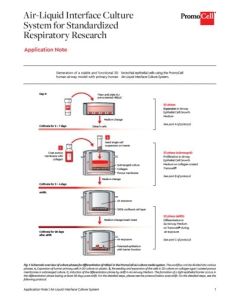
Air-Liquid Interface Culture System for standardized respiratory research
Generation of a stable and functional 3D human airway model with primary human bronchial epithelial cells using the PromoCell Air-Liquid Interface Culture System. -
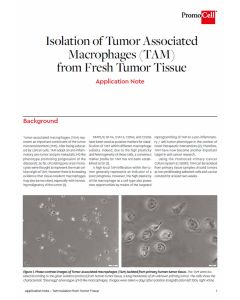
Isolation of Tumor Associated Macrophages (TAM) from Fresh Tumor Tissue
Tumor-associated macrophages (TAM) represent an important constituent of the tumor microenvironment (TME). -
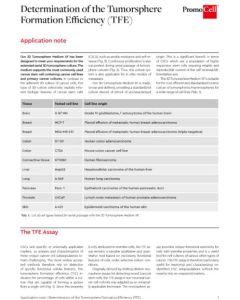
Determination of the Tumorsphere Formation Efficiency (TFE)
Determine the tumorsphere formation efficiency using an assay to quantify the ability of single cells to form spheres. Our defined and xeno-free 3D Tumorsphere Medium enables you to cultivate cancer stem cells. -
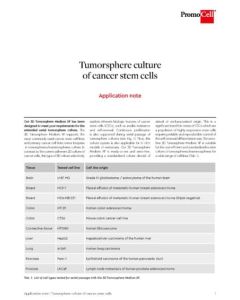
Tumorsphere culture of cancer stem cells
Find out how to cultivate cancer stem cells in tumorspheres using our defined and xeno-free 3D Tumorsphere Medium. This enables you to characterize such cells and study their malignancy. -
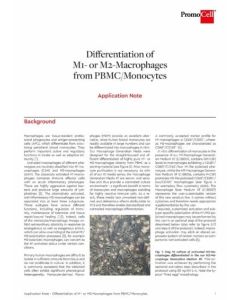
Differentiation of M1- or M2-Macrophages from PBMC/Monocytes
Here we describe how the presence of PromoCell differentiation media encourages in vitro differentiation of mononcytes to macrophages. These then show either an M1-like or an M2-like polarization. -
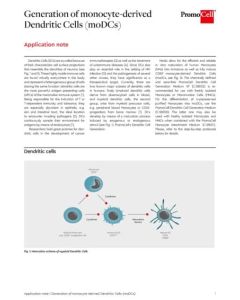
Generation of monocyte-derived Dendritic Cells (moDCs)
We offer a step-by-step protocol for the in vitro maturation of human monocytes into immature monocyte-derived dendritic cells (moDCs), as well as into fully mature moDCs, using PromoCell media. -
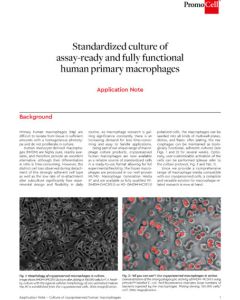
Standardized culture of assay-ready and fully functional human primary macrophages
Cryopreserved human macrophages are now available as a reliable source of standardized cells, and our ready-to-use format provides full experimental flexibility. With this easy-to-handle application, your macrophage research will be more efficient. -
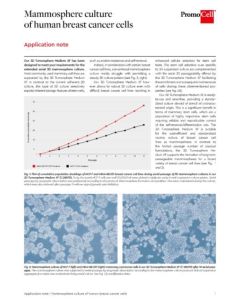
Mammosphere culture of human breast cancer cells
PromoCell 3D Tumorsphere Medium XF allows robust 3D culture even when using breast-cancer cell lines. Mammospheres are now regarded as highly valuable in vitro models for studies on tumor formation and metastasis. -
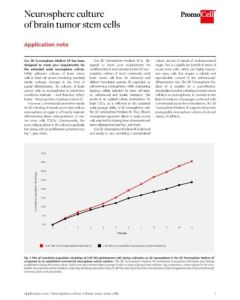
Neurosphere culture of brain tumor stem cells
Using 3D cultures of brain cancer cells as neurospheres in serum-free conditions maintains the properties of primary tumors. In vitro models with the 3D Tumorsphere Medium XF are an essential prerequisite for research aimed at identifying ways to eradicate brain tumor cancer stem cells. -

Endothelial cell transmigration and invasion assay
Angiogenesis, the development of blood vessels from existing ones, is an essential process. Common in vitro models are the transwell migration assay and the cell invasion assay. -
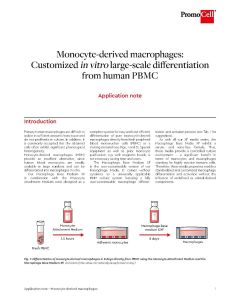
Monocyte-derived macrophages: Customized in vitro large-scale differentiation from human PBMC
Primary human macrophages are difficult to isolate and do not proliferate in culture. We offer a complete system for easy and cost-efficient generation of pure monocyte-derived macrophages. -

Endothelial cell tube formation assay (in vitro angiogenesis assay)
Different processes lead to formation of new blood vessels in the human body. The in vitro tube formation assay allows researchers to study such mechanisms in cell culture. -
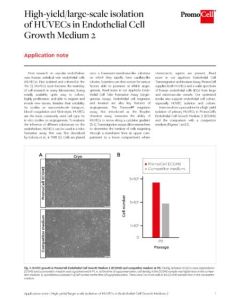
High-yield isolation of HUVECs in Endothelial Cell Growth Medium 2
Here we show a procedure for a high-yield isolation of primary HUVECs in PromoCell’s Endothelial Cell Growth Medium 2 (ECGM2) and the comparison with a competitor medium. -

Epi-Fluorescence mitochondrial imaging in live single cells and tumorspheres
Mitochondria are the organelles that fuel life, which makes them extremely important for research. We offer a special dye for live-cell and fixed-cell imaging. Use this dye to boost your mitochondria research. Find out how. -

Holotomography-monitored phagocytosis assay of M1 macrophages
Phagocytosis is an essential process for pathogen clearance and is the subject of research for many immunologists. Find out more about PromoCell's phagocytosis assay for fluorescence microscopy and how you can implement this method in your lab. -
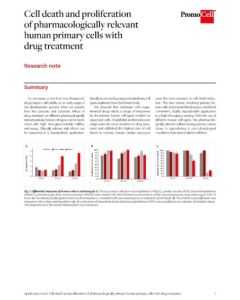
Cell death and proliferation of pharmacologically relevant human primary cells with drug treatment
Cytotoxic effects of a drug can be a crucial factor that differentiates a blockbuster from a failure. We assessed cytotoxic sensitivity of various primary cells in our portfolio using a high throughput-suitable assay. -
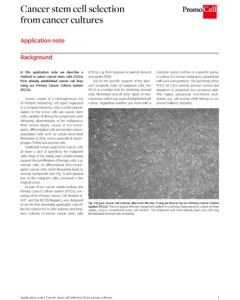
Cancer stem cell selection from cancer cultures
Traditional culture systems for cancer cells all share a lack of specific growth support for malignant cells. PromoCell's Primary Cancer Culture System is a reliable tool for depleting stromal cells, fibroblasts, and all other types of non-cancerous cells. -
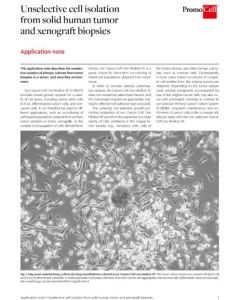
Unselective cell isolation from solid human tumor and xenograft biopsies
Do your primary cells from solid human tumors and xenografts need broad growth support? Then find out how to employ the serum-free, non-selective Cancer Cell Line Medium XF. -
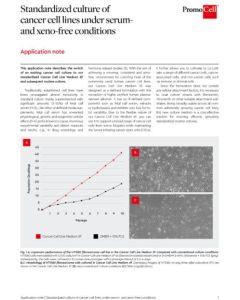
Standardized culture of cancer cell lines under serumand xeno-free conditions
Undefined media supplements have unwanted effects on cell cultures. Learn how to obtain more accurate and comparable results with PromoCell’s Cancer Cell Line Medium XF. -
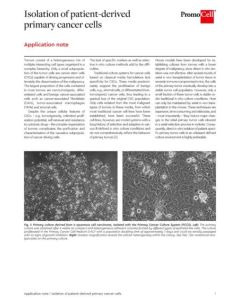
Isolation of patient-derived primary cancer cells
Isolate tumor cells from patient samples and transform them into long-term cell cultures. Learn more about the primary cancer culture system and how it compares to other established culture methods. -

Vascular cell culture under physiological oxygen tensions – implications for cellular redox homeostasis
If the amount of reactive oxygen species exceeds the cells antioxidant capacity, your research subjects are stressed. Find out how you can shift your cell culture conditions and establish physiological conditions. -
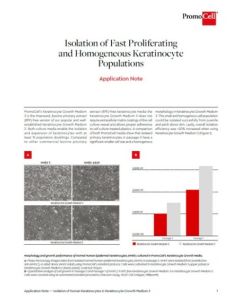
Isolation of fast proliferating and homogeneous keratinocyte populations
Using the serum- and BPE-free Keratinocyte Growth Medium 3 for the isolation of keratinocytes showed an overall 50% increase of isolation efficiency with a significant smaller cell size and a homogenous morphology. -

Isolation of patient-derived cancer stem cells from GIST liver metastasis
Isolation of CSCs from tumor biopsies is critical for the development of new cancer therapies. Learn more about how our PCCS is supporting the isolation of cancer stem cells from liver metastases of gastrointestinal stromal tumors (GIST). -
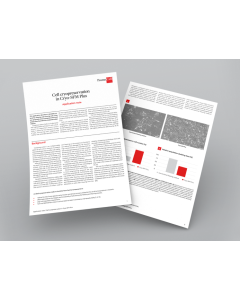
Cell cryopreservation in Cryo-SFM Plus
This application describes a detailed protocol for freezing and thawing cells using our advanced defined, animal component-free and protein-free Cryo-SFM Plus cryopreservation medium. -

Human white preadipocyte differentiation
This application note provides a detailed protocol for the differentiation of preadipocytes into mature adipocytes.

